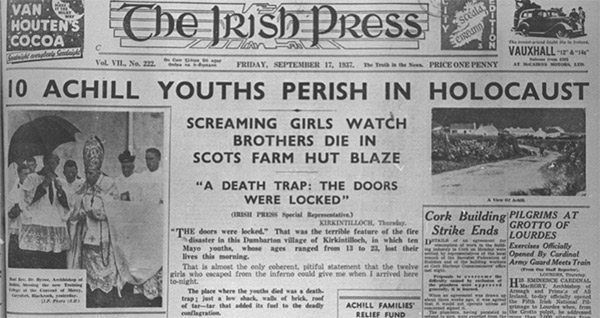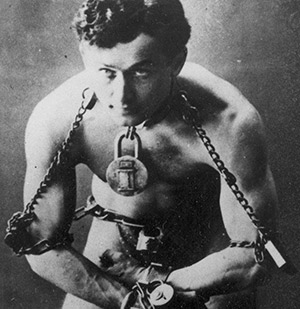ON THIS DAY
Published in Issue 5 (September/October 2018), News, Volume 26BY AODHÁN CREALEY
SEPTEMBER

Above: Front page of the Irish Press of Friday 17 September 1937, reporting the tragedy.
16/1937
Ten male seasonal potato-gatherers, aged 13–23 years, from Achill Island perished in a fire in Kirkintilloch, near Glasgow. The group had only arrived in the village the previous evening. The females were lodged in a cottage and the ten males in a nearby bothy, which was basically a cowshed, to sleep there on inverted potato boxes covered with straw. When the fire broke out in the early hours of the morning they found that they had no means of escape, as the door was padlocked and the windows netted with wire. By the time the alarm was raised the bothy was engulfed in flames and the roof had collapsed. Their charred remains were found huddled against a wall. Only one, a lad called John McLoughlin, could be identified. Coming less than two years after nineteen ‘tatie-hokers’, as they were called, from Arranmore Island drowned on their way back from Scotland, the tragedy once again highlighted the plight of the c. 5,000 young Irish seasonal workers who led a nomadic existence in Scotland, toiling for wages that the lowest-paid Scottish labourer wouldn’t accept—and in the most wretched conditions. The fire took a terrible toll on individual Achill families. The Mangan family lost three sons. Mary, from the same family, was amongst the females in the group. Two other families lost two sons. The subsequent inquest concluded that the ten died from carbon monoxide poisoning caused by overloading with coal of the stove or hot plate in the bothy as they slept. It also recommended that all accommodation for seasonal workers should be inspected and passed as safe and proper by the appropriate local authorities.
03/1998
Bill Clinton arrived on the second of his three visits to Ireland as president of the United States.
07/1948
At a press conference in Ottawa, Taoiseach John A. Costello announced that he intended to repeal the External Relations Act (1936), taking Ireland out of the British Commonwealth.
11/1968
Denis McCullough (85), co-founder of the Dungannon Clubs (1905) with Bulmer Hobson and director of the IRB in Ulster at the time of the Easter Rising, died.
13/1868
Richard Rothwell (67), Athlone-born romantic painter, died in Rome. His funeral and burial beside the poet John Keats in the city’s Protestant Cemetery were arranged by the painter Joseph Severn.
13/1968
The first Merriman Summer School opened in Ennis, Co. Clare.
14/1948
The remains of the poet W.B. Yeats (1865–1939) were re-interred ‘under bare Ben Bulben’s head’ in the Church of Ireland graveyard, Drumcliff, Co. Sligo.
14/1968
St Patrick’s College, Maynooth, admitted its first lay students to degree courses.
15/2008
Lehman Brothers, the fourth-largest US investment bank, filed for bankruptcy, bringing the global financial system close to collapse.
17/1918
Chaim Herzog, sixth president of Israel (1983–93), born in Belfast, the son of Yitzhak HaLevi Herzog, Ireland’s Chief Rabbi (1919–37).
22/1918
Hanz Scholl, founding member of the White Rose resistance movement in Nazi Germany, who was executed in February 1943 along with his sister, Sophie, born in Forchtenberg.
29/2008
‘Night of the Guarantee’. Faced with the impending collapse of Anglo-Irish Bank, the government guaranteed the deposits, bonds and loans of all Irish-owned banks and financial institutions.
30/1938
The Munich Agreement was signed by Germany, France, Italy and the United Kingdom. In return for a guarantee that it would be his last territorial demand in Europe, it allowed Hitler to annex Sudetenland, the mainly German-speaking portions of Czechoslovakia.
OCTOBER
31/1926

Above: Harry Houdini—made a number of visits to Ireland.
Harry Houdini (52), Hungarian-American illusionist and escapologist, died. Over the course of a 25-year career Houdini proved that he could escape from anything—from handcuffs and straitjackets to locked mailbags, riveted boilers and sealed crates. But he was much more than an international celebrity. A dedicated professional, he was president of the Society of American Magicians from 1917 until his death, during which time it became the biggest society ever in the history of magic. He was also the scourge of bogus spiritualists, exposing dozens of them by attending séances in disguise, accompanied by a policeman and a reporter, which in turn brought about his famous spat with his one-time friend Arthur Conan Doyle, who insisted that Houdini was a powerful spiritualist medium who was using his gift to sabotage those of other mediums. He made a number of visits to Ireland. In January 1909, whilst appearing in Belfast’s Hippodrome Theatre, the directors of Harland and Wolff had him encased in a large sealed chest made from the same wood they were using to build their latest liner, the ill-fated Titanic. Lowered into the chilly waters of Donegal Quay, he slipped out in a few minutes, leaving the chest intact. Yet he didn’t rule out the possibility of communicating with the departed. Before his death, he and his wife Bess agreed that, if possible, he would communicate from the afterlife with the message ‘Rosabelle believe’, Rosabelle being their favourite song. She duly held annual Hallowe’en séances after his death but without success. In 1936, after the annual event in Chicago’s quaintly named Knickerbocker Hotel, she gave up. ‘Ten years is long enough to wait for any man’, she declared.
05/1968
Seventy-seven marchers and eleven members of the RUC were injured in violent clashes during a banned Northern Ireland Civil Rights march in Derry.
06/1998
RUC Constable Frank O’Reilly (30), a Catholic, died from injuries sustained in a loyalist blast-bomb attack in Portadown a month earlier, the last of 303 members of the RUC to die in the Northern Ireland Troubles.
09/1958
Pope Pius XII (82), head of the Catholic Church during the Second World War, died.
10/1918
The City of Dublin Steam Packet Company’s RMS Leinster was torpedoed by a German U-boat one hour out of Kingstown/Dún Laoghaire; 501 of the 771 on board died.
11/1968
Students at Queen’s University, Belfast, formed People’s Democracy in reaction to events in Derry in the previous month.
14/1318
The Battle of Faughart, Co. Louth. Edward Bruce, brother of Robert Bruce, king of Scots and self-proclaimed ‘king of Ireland’, was defeated and killed by an Anglo-Norman force under the command of John de Birmingham and the archbishop of Armagh.
14/1918
The Newry and Dundalk Steam Packet Company’s SS Dundalk was sunk by a German U-boat seventeen miles south-west of the Isle of Man. Twenty sailors were killed and a dozen others were rescued.
15/1968
Nationalist MPs withdrew from Stormont and thereby ceased to be the official opposition in the Northern Ireland parliament.
16/1968
African-American athletes Tommie Smith and Juan Carlos raised black-gloved fists as the Star-Spangled Banner played during their medal ceremony at the Olympic Games in Mexico City. The gesture was not a ‘Black Power’ salute, Smith later declared, but a ‘human rights salute’.
23/1993
Nine Protestants, including four women and two children, and a member of the IRA died when an IRA bomb exploded prematurely in Frisell’s fish shop on the Shankill Road, Belfast.
25/1968
The New University of Ulster in Coleraine, Co. Derry, Ireland’s first new university in over 50 years, officially opened.
















